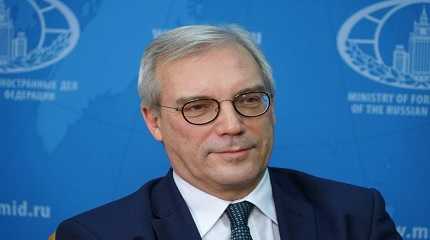
MOSCOW, July 1. /TASS/: The result of the NATO summit in Madrid have demonstrated that the alliance has returned to the Cold War-era military security schemes, Russian Deputy Foreign Minister Alexander Grushko said on Friday.
"I think that the key conclusion we can draw is that in Madrid NATO has completed an evolution somersault in its development after its establishment in 1949 and has returned to its roots, i.e. to the Cold War-era military security schemes," he said at a meeting of the Valdai international discussion club.
According to the Russian diplomat, this U-turn began long before the beginning of Russia’s special military operation in Ukraine, somewhen at the turn of 2012 and 2013, "when NATO passed a principled decision to end its mission in Afghanistan." Notably, the alliance agreed back then that it was not for action in the changed security situation, he added.
"All of its military interventions, starting from Bosnia, Yugoslavia, Libya, let alone Iraq, although most of the NATO countries also took part, and finally Afghanistan, led to results, to put it mildly, contrary to the expectations. And back then, NATO plunged into a discussion again: if the policy of expansion has largely exhausted its resource, the geopolitical space has been developed, the European Union and NATO have merged to a larger extent in military terms, interventions are void, what else is to be done? And a principle decision was made to move toward giving priority to article 5 of the Washington agreement again and to begin getting prepared to confrontation with a comparable enemy, including a possible high-intensity conflict," Grushko said.




